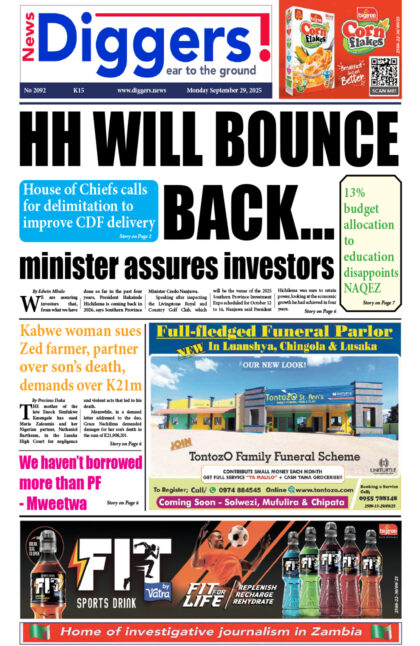The Consumer Unity and Trust Society (CUTS) says 2017 was a mixed up year for consumers because government made a number of drastic decisions that affected Zambians in different ways throughout the year.
CUTS centre coordinator Chenai Mukumba noted in a statement to News Diggers yesterday that the removal of subsidies from the fuel and electricity sub-sectors were some of the tough decisions that government made that even led to a hike in price for the two commodities.
“Tough decisions were made in 2017 when the government removed subsidies from the fuel and electricity sub-sectors which in turn saw a hike in price for these two commodities. This was very difficult for consumers but necessary according to government. In September 2016, Zambia saw the complete removal of fuel subsidies as a measure to put the country back on the path of economic recovery, as well as reduce the burden on the treasury. As a result of the bi-monthly annual review, consumers were met with both increases and decreases in the price of fuel during the year. Unfortunately, while the increase in the price of fuel was accompanied by an increase in the price of transportation these price changes were not reflected in the transportation sector when fuel prices reduced and as such consumers were adversely affected,” Mukumba stated.
“In 2018 we urge the Energy Regulation Board to stick to its commitment of undertaking bi-monthly reviews of the cost of fuel. For this process to truly benefit the consumer, it is important that the ERB stick to this policy commitment so that consumers can benefit when the performance of the Kwacha and the international price of oil is in their favour. In addition it is important for the ERB to maintain consistency and predictability in its interventions.”
And Mukumba stated that electricity tariffs were likely to be adjusted this year.
“The energy sector also saw changes when government resolved to hike electricity tariffs. The tariffs of electricity were increased by 25 per cent in May, 2017 and later increased by 50 per cent in September the same year. While government ensured a life line tariff of 200 units, there was a significant complaint from SMEs who noted that this meant an increase in production costs. In 2018 we expect that the government will conclude with the Cost of Service study — this study will ensure that as consumers we are aware of the true cost of producing electricity and that we do not subsidise inefficiencies of ZESCO. In light of the findings of the study it is likely that we will see another change in the cost of electricity this year. We hope that the change of electricity tariffs will be across and inclusive of all sectors, particularly the mining sector,” she stated.
Mukumba further commended government for its efforts to maintain a single digit inflation rate.
“Last year saw a significant decrease in the inflation level. By December 2017, the Central Statistics Office (CSO) in their monthly release indicated an inflation rate of 6.1 percent. According to the CSO. The year on year inflation rate as measured by the all items Consumer Price Index (CPI) for December 2017 had increased to 201.8 compared to 196.33 recorded in September 2017. This means that on average, prices increased by 6.1 percent between December 2016 and December 2017. As CUTS we welcomed this especially given that in February of 2016, the inflation rate reached a record high of 22.9%. The government should be commended for maintaining the inflation rate at a single digit. Our expectation is that in 2018 the economy maintains single digit inflation between six and eight percent as was indicated in the 2018 National Budget address,” Mukumba stated.
Meanwhile, Mukumba commended the Competition and Consumer Protection Commission (CCPC) and the Zambia Information Communication Technology Authority (ZICTA) for fining Zambia Sugar and the three mobile service providers respectively for failure to provide quality in their goods and services.
“The Competition and Consumer Protection Commission (CCPC) in October 2017 fined Zambia Sugar more than K76 million for price discrimination and unfair pricing after an investigation that had lasted four years revealed the irregularities. Zambia Sugar management however disputed the Commission’s findings from both the factual and legal perspective. We welcomed and commended this decision by the CCPC as the cost of sugar in Zambia had been an area of concern for us for a number of years,” stated Mukumba.
“And Zambia Information and Communication Technology Authority (ZICTA) in December 2017 fined all the three mobile phone operators a total of K3.1 million for failing to adhere to Quality of Service parameters as agreed in the Quality of Service Guidelines for the third quarter of 2017. Indeed the performance of the three mobile service providers had been an area of concern for many consumers for a long time. We therefore commended ZICTA for holding them accountable.”
























